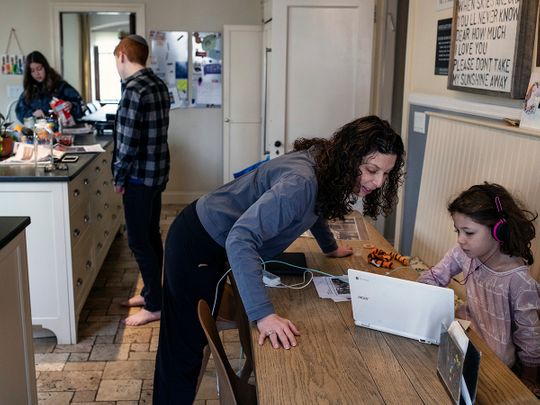
NEW YORK - For two women who had learned just the day before that they had tested positive for the coronavirus, the call on Saturday from the New York City Health Department offered some implausibly good news, they recalled.
One of the women had to stay under quarantine. But the other, who had been without symptoms for a few days, was free to go about her life.
As strange as that sounded, the reversal that followed showed how haphazard the official handling of the quarantine process has sometimes been in clusters of virus cases across the New York region and elsewhere in the United States.
At 11:30 p.m. that evening, a Health Department worker came to the apartment where the women had been staying since they returned sick from a cruise. He told them not to open the door and slid a sheet of paper under it. The women said they were told to sign the document and slide it back out.
It was an isolation agreement: Both women were confined to the apartment indefinitely, until the Health Department declared them safe.
142
coronavirus cases in New York stateAs the number of coronavirus cases in New York state rose to 142 on Monday, government officials scrambled to limit the spread. Dozens of colleges and schools were closed, events were canceled and many thousands of people across the nation were under quarantine - one of the most powerful tools at the government's disposal.
But a week after the virus first appeared in New York, the state residents under quarantine have largely been left to fend for themselves.
Local health departments in New York state are supposed to check in daily even with people under precautionary quarantine, the lowest category of risk for contracting the virus. But in many cases, they have not started doing so yet.
And when the authorities do issue guidance or directives, they can seem contradictory or illogical.
"We've been told everything from it was OK to go out, to we had to sign a release that we're housebound now," said one of the women who received an isolation order and who spoke on the condition that her name not be published. "We've been told we don't need to be tested, to we have to be tested. We've been told that someone's coming to our house to test us, to 'You've got to find someplace.'
"We've been told to call ahead for testing so that they're prepared, and we get there, and nobody is prepared, we're just in the emergency room with everyone else who's waiting. It's been very crazy."
The presence of the coronavirus in New York had been anticipated for weeks; in January, New York City's health commissioner declared that it was "inevitable."
Yet city and state health officials said that because the outbreak had accelerated so quickly, it required a constantly evolving public health response.
"This thing is moving like a freight train," Mayor Bill de Blasio said on Monday. "A lot is changing quickly."
State officials defended their handling of those under quarantine.
"We are in constant communication with local health departments and maintain a strong presence in the community that is currently most impacted," a spokeswoman for the department, Jill Montag, said in a statement.
Calculated risk
The New York City Health Department did not immediately respond to a request for comment on the frustration New Yorkers have expressed about navigating the quarantine process.
People under quarantine across the city said they were finding more questions than answers about how to handle everything from the mundane chores of daily life to the most primal tasks of parenting.
What do you do if some of your children are quarantined and others aren't? Can two children under precautionary quarantine play with each other? How should parents who are not under quarantine interact with children who are?
The other night, on the porch of her house in the Riverdale section of the Bronx, Jessica Haller took a calculated risk. She hugged her teenage daughter.
A few blocks away, when Deborah Berkowitz's 6-year-old son swooped in for a hug, she flinched. "I just patted him on the head," she said.
Both children seemed perfectly healthy but they were both under precautionary quarantine because people with the virus had been in their schools. Neither mother was under quarantine. Neither woman had any idea whether she had done the right thing, and both said that similar conundrums arose all day long.
"It's funny," said Haller, 44, a former technology executive who is running for City Council. "I'm not allowed to let people into the house, but I'm allowed in and out of the house."
Berkowitz, 46, who works at a museum in New York City, expressed a similar sentiment.
"I could go to work tomorrow," she said. "I think that's weird. It seems extreme on one end and 'Eh, just a precaution' on the other."
Late Sunday, the principal at the private school that Haller's four children attend, Salanter Akiba Riverdale Academy, which has been closed since last Tuesday, sent an email to parents acknowledging the confusion.
"Thank you for your patience as we continue to wait to hear back from the New York State Department of Health with clearly written quarantine guidelines," the principal, Rabbi Binyamin Krauss, wrote. "We know that many of you are awaiting clarification and answers."
Rather than continue to wait, several parents at the school who are also doctors distributed their own guidelines for quarantined students and parents, addressing many of the questions the state has yet to answer.
Krauss said that he, too, had sometimes been left to wonder about the most basic questions. "Even the fact of whether I should be quarantined has not been consistent," he said.
There were also more prosaic quandaries.
"Can we take out the trash?" asked the daughter of one of the women from the cruise, who put herself in precautionary quarantine after days of trying to get a straight answer from the health authorities on whether to do so. "Can we go in our backyard?" The woman, like her mother, spoke on the condition that her name not be published.
The younger woman's boyfriend chimed in: "What do the quarantined do about alternate side parking?" (His question was relayed to city officials at noon on Sunday. At 4 p.m. Monday, it remained unanswered.)
Even when the authorities provide answers, they are often inconsistent.
Gov. Andrew M. Cuomo, for example, said last week that the "virus on a hard surface lives for about 24 hours." The next day, a deputy commissioner from the City Health Department said it can survive only "a couple of minutes."
State guidelines say that if someone is under precautionary quarantine, "food must be delivered to the person's quarters." De Blasio's guidance was a little looser.
"A person can stay in their apartment, can get, you know, if they're able, food deliveries or friends or relatives can bring them food, whatever it is," he said on Friday. "That doesn't mean you can't, you know, get a little fresh air for a minute."
On Friday, after the chief rabbi of the Westchester County synagogue at the center of the biggest cluster of cases had tested positive for coronavirus but had no symptoms, Yeshiva University, where the rabbi teaches, sought to reassure students and co-workers.
The university said that doctors from the city Health Department had told the school that "individuals who have been in contact with an asymptomatic person who has tested positive for COVID-19 virus do not need to be placed in quarantine."
Yet on Saturday, the state Health Department ordered quarantine for members of the same synagogue who had been at any of five recent events, even though it was not clear whether symptomatic people were at all five events.
The state of emergency declared by Cuomo over the weekend should help his administration quickly hire workers to help local health authorities monitor quarantined patients, but the process is just getting started.
Haller, one of the Riverdale parents, spent most of last week wondering how to deal with her two older children being under precautionary quarantine while her two younger children were not.
By the end of the weekend, the question was moot: All students at her children's school were placed under quarantine until at least March 16.
This time, Haller did not hesitate when she got the news.
"I will, and have, hugged and wiped the tears of my little ones," she said.








